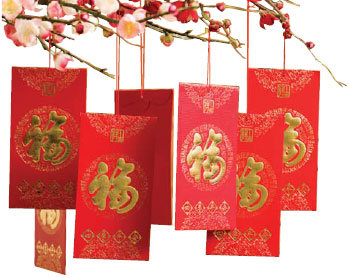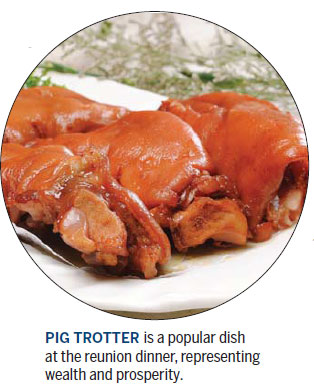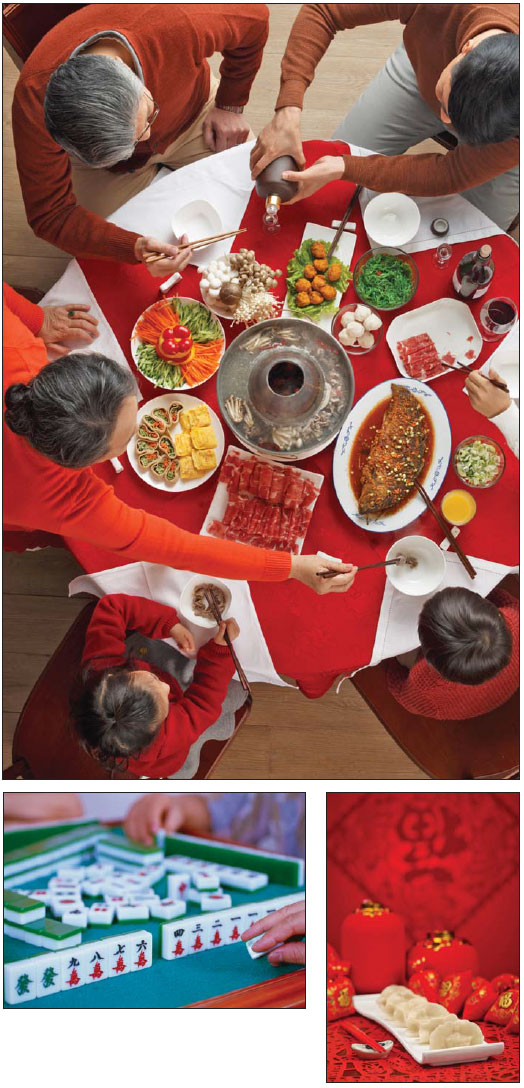Reunion of the Year

Editor's note: To understand China, sit down to eat. Food is the indestructible bond that holds the whole social fabric together and it is also one of the last strong bonds of community and culture.
You've probably read all about it in the news - the annual exodus of migrant workers from the cities. For the past week, millions of Chinese have risked smog, snow and fog to hurry home for dinner. The migrant masses would have planned for months and booked their tickets way in advance for this crucial trip.
Today is the eve of the lunar new year, a day which will start off the Spring Festival holidays. The meal we're talking about is the all-important reunion banquet, the last dinner of the year for the whole family - tuanyuanfan.
It is a time-tested tradition for the extended family to gather for this dinner, no matter how far away they've gone from home during the year.

| Clockwise from top: It is a happy occasion with the extended family at the all-important reunion banquet of the year. Jiaozi is a must on the occasion, which symbolizes the changeover from old to new. Mahjong is the icing on the cake. Chuai Chatu / For China Daily |
For many in China, this is also the only holiday they get to spend with their family, when they can relax for a few days and catch up with friends, eat, drink, play and sleep late before they go back to the grind.
It is a happy occasion, a loud raucous celebration with lots of card games, mahjong and merry-making. But most important of all, it is a time for all Chinese to reconnect with their cultural and culinary roots.
It is a time to pay respects to the parents by acknowledging and honoring the effort they had invested in the family. It is a time to bond with siblings and cousins, aunts and uncles.
It is also a time to feast.
The reunion dinner table will be overflowing with the most delicious tastes of home, all appropriately named to usher in peace, prosperity, happiness and good luck for the new year.
In the frozen north, a feast of fish is the best way to celebrate. Fish is yu, homophonic with great abundance, and an ingredient that is treasured for its rarity. Huge half-meter monsters are fished from the frozen lakes and rivers in massive operations that involve the whole community.
The fish will be seared, then braised in iron pans with sloping sides on which grain pancakes will bake, later to be eaten with both fish and pan juices.
Still north of the Yangtze, wheat is the staple and noodles and dumplings appear with monotonous regularity at every festive occasion. For the Spring Festival, dumplings are part of the menu of comfort foods.
Jiaozi sounds like the words for transition, symbolizing the changeover from old to new. In many places, the home chefs will place little surprises in the dumplings - a red Chinese date, a little silver coin, a cooked chestnut.
The fortunate bachelor who gets the red date in his dumpling will have a sweetheart in the new year, while the chestnut will bring a new baby to the family. The silver coin signifies good luck and prosperity and is probably the most coveted prize.
For symbolic dishes served at the reunion dinner, no one does it better than the Cantonese. Every dish on the table is carefully named so the entire menu reflects an abundance of blessings.
There will always be a whole fish, niannian youyu, for abundance every year. This dish is usually saved so it can be served again on the first day of the new year, so the riches of the past year will continue to be enjoyed.
An entire pig trotter braised with black moss and mushrooms may be the next attraction, facai zhushou. This dish represents wealth and prosperity.
Another popular dish is fried diced seafood and vegetables wrapped in beancurd skin and steamed. These little "money bags" are called jinyin mantang, or halls filled with gold and silver.
Dried oysters, known as hou-see in Cantonese, are often cooked with mushrooms so the businessmen in the family will find a good marketplace for their products and services.
The list goes on.

It is normally during dinner that the young, unmarried members of the family will get their yasuiqian, red packets of money that will help them enter the new year happily and safely.
The festivities will slowly peak after dinner. Once the dishes are cleared and washed, the dough boards will be brought out. In the north, the whole family will start kneading dough and rolling out dumpling skins. Trays of dumplings will be set out, ready for the next day.
Traditionally, there will be minimal cooking on the first day of the Spring Festival, a time devoted to welcoming close relatives and friends to the house.
As the family gather to make dumplings, the television will be tuned in to the annual variety show put out by national broadcasters, China Central Television. It is entertainment designed to please the whole family, with songs, dances, skits, magic acts and the beloved acrobatic and martial arts displays.
If there is an elderly person in the household, the family will be careful to keep bright lights burning as a prayer for longevity.
At 11 pm, the start of the hour of the Rat, the New Year officially begins and the young ones will gather in gardens and backyards to light firecrackers and fireworks.
For the next 15 days, the normal ban on fireworks will be lifted in all major Chinese cities and there will be firecrackers all day and fireworks displays each night.
The card games, mahjong sessions, eating and drinking will go on almost all night, at least until the Golden Rooster crows and ushers in a brand new lunar year.
Here's wishing one and all a peaceful and prosperous New Year and a very happy Spring Festival.
paulined@chinadaily.com.cn
(China Daily Africa Weekly 01/27/2017 page19)
Today's Top News
- Xi hears report from Macao SAR chief executive
- Xi hears report from HKSAR chief executive
- UN envoy calls on Japan to retract Taiwan comments
- Innovation to give edge in frontier sectors
- Sanctions on Japan's former senior official announced
- Xi stresses importance of raising minors' moral standards






























